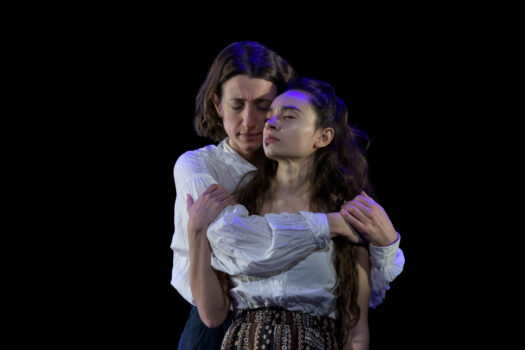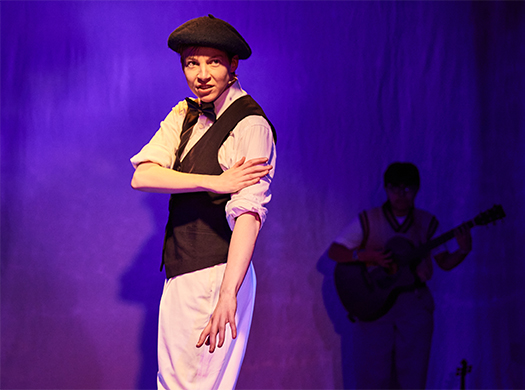Omnibus Theatre’s queer Festival 96 celebrates its 9th year: lending a stage to LGBTQ+ artists and offering a platform to engage and educate viewers. Using historical queer icons, the festival presents the plays ‘George’ and ‘Joe Carstairs’. These plays transport the stories of these 19th and 20th century heroes to Clapham Common, fostering a deeper understanding of these individuals, who seem to have slipped from the public eye.
It seems that in queer history, we have overlooked the impact of singular individuals in pivoting political and social conventions, especially predating the 20th and 21st century. With LGBTQ+ identities existing even in early civilisations, who were the people that lay the foundations for the queer community as we know it?
Known under the pseudonym ‘George Sand’, Amantine Lucile Aurore Dupin was born in 1804. With her parents lost in her early years, she was left under the care of her grandmother, an aristocratic woman, who firmly believed that Amantine should receive a formal education. In early 19th century France, women’s educational opportunities were limited and it seems that her family’s wealth is what lent her the ability to study. Amantine was known in the queer community, due to her breaking of societal norms: sporting men’s clothing at a time when permissions were required for females to do so, having affairs with both men and women and also her pursuit of a career. This career was what defined Amantine: as she broke into a male dominated literary sphere, finding success under the guise of a male identity: acting as both a gender subversion but also giving a female insight into the harsh reality of women.
‘George’, directed by the award-winning actor and writer, Léa des Garets, is a depiction of Sand’s life, shedding light on her personal life, including her relationship with Marie Dorval, and the challenges she faced, when writing ‘Gabriel’.

Léa des Garets, when interviewed, stated: “I am French and in France she is quite well-known but often in a very limited way. Although she sold more books than Victor Hugo and Honoré de Balzac in her time, she isn’t nearly as well known today!“. After reading Sand’s autobiography she felt compelled to write about the author and her queerness: her courage to act against the grain, despite media scrutiny. “ She has something to say to our time!”. George Sand’s “queerness, in all aspects of the word” is a particular part of her identity that Des Garets hopes to demonstrate, through not only the affairs that she shared, but also her literary material that “encapsulated” what it meant to be a queer woman at the time.
Des Garets claimed to have “found a soul sister”, and in bringing this important figure to stage, she invites viewers to “have a moment of introspection” and think “where have we made progress?”, using the past to “encourage this kind of social examination”. “I feel so incredibly inspired by someone who dared to be her full self, and who demonstrated that social norms, gender stereotypes, gender roles, dress codes, binarity, pronouns etc. were irrelevant! She is a true queer icon for me, a beacon of freedom. I hope that people will want to learn more about Sand! And I hope that people talk about the importance of representation and visibility, and the importance of encouraging true diversity of artists and stories. Seeing queerness on stage, hearing different accents on stage, seeing someone who looks/sounds like oneself and who has ideas we share is incredibly important for one’s evolution and development! I also hope that people reflect on whether we have indeed improved or not. And at its core, GEORGE is about authenticity: it is an invitation for audiences to truly be themselves!”
Like George Sand, Joe Carstairs was another queer individual widely recognised for her achievements, however Carstairs was born in London: the child of an American heiress. Joe Carstairs was celebrated for her athletic feats as a powerboat racer, her war efforts and her successful car chauffeuring business, run completely by women. Acknowledged publicly for her non-conformist style, Joe Carstairs, like Sands dressed in a masculine fashion, wearing trousers and sporting tattoos on her arms. She was known publicly as a lesbian and was documented to have a number of affairs with celebrities such as Marlene Dietrich and Oscar Wilde’s niece, Dolly Wilde. She lead an eccentric life, working for the Red Cross aged 16, driving ambulances, seen socialising with Paris bohemians and later going on to become the fastest woman on water, and even dubbed ‘The Boss’ of Whale Cay in the Bahamas.
In the upcoming play ‘Joe Carstairs’, written by Franko Figuerido and Krysia Mansfield, the story of Carstairs is presented through the lens of a young creative, offered the chance to make a play about the boat-racer. Here Hik, the young playwright compares society’s standards for queer individuals and explores how and if it has altered with time.

Rhiannon Bell as ‘Joe Carstairs’
Franko Figueiredo, the co-writer of ‘Joe Carstairs’ expressed the significance of bringing Carstairs to the stage, claiming that historical figures “serve as a potent tool”: acting as a means of education and also a catalyst to inspire audiences “ to delve deeper into history and its lasting effects”. With queer individuals like Carstairs having lived before members of the LGBT+ community today, sharing their story “ validates the experiences of queer individuals” and prevents their meaningful stories from being “overlooked or erased”.
The use of character Hik, is described as a means to express an “uncertainty on how best to convey history authentically” throughout the writing process, with the character “showcasing” the “struggle to retell the story of a queer icon amidst modern complexities”. This, however, is also used as a way to compare these different times and address the issues that were not recognised in the 1920s,”particularly with the trans community”.
This play attempts to explore Carstairs’ privilege and provide a new perspective “on the role of class and privilege on gender expression and rights, historical comparisons between the surge of anti-LGBT sentiment in late 1920s and how that is mirrored today in 2020s”.
These productions illuminate historical figures essential to the development of queer identity. They draw on the individuals’ provocative and confident defiance while examining the contexts of their achievements and the role of privilege in their freedom. Audiences are invited to reflect on how history has evolved and its lasting effects on today’s society. Both plays deliver powerful stories that stand as testaments to the queer community’s strength and resilience in surviving the tests of time.
Image Credit: Benjamin Graham (George) , Henri T (Jo Carstairs)
Feature by Teodora Wollny
Read Teodora’s latest Review: Wendy Beckett’s ‘Sappho’ is a captivating blend of ancient history and contemporary queer culture – Southwark Playhouse Elephant, now on until 25 May – Abundant Art
Omnibus Theatre’s 96 Festival is London’s only queer arts festival under one roof, with an eclectic fest of theatre, comedy, cabaret, music, art and activism that’s named in honour of the year when Clapham Common hosted the Pride after-party.
Jo Carstairs – 4–22 June 2024, Running Time: 110 mins (including interval) | Suitable for ages 13+
Tickets and Information: Joe Carstairs – Omnibus Theatre (omnibus-clapham.org)
George – 25 June- 4 July 2024 , Running Time: 95 mins (no interval) Suitable for ages 16+
Tickets and Information: www.omnibus-clapham.org/george-2/